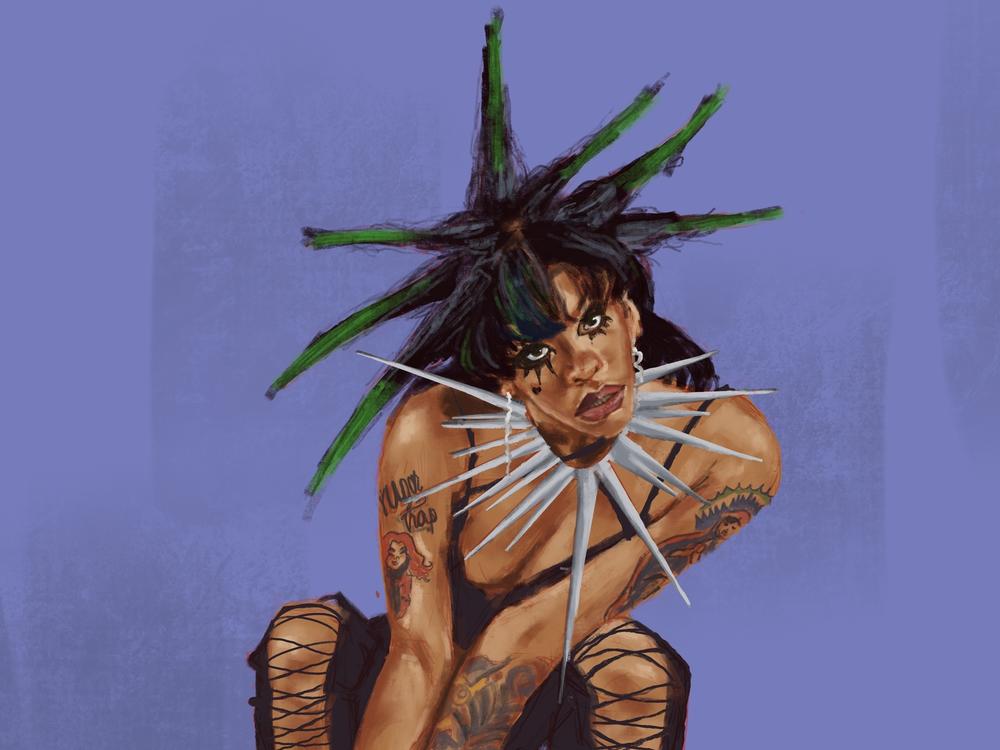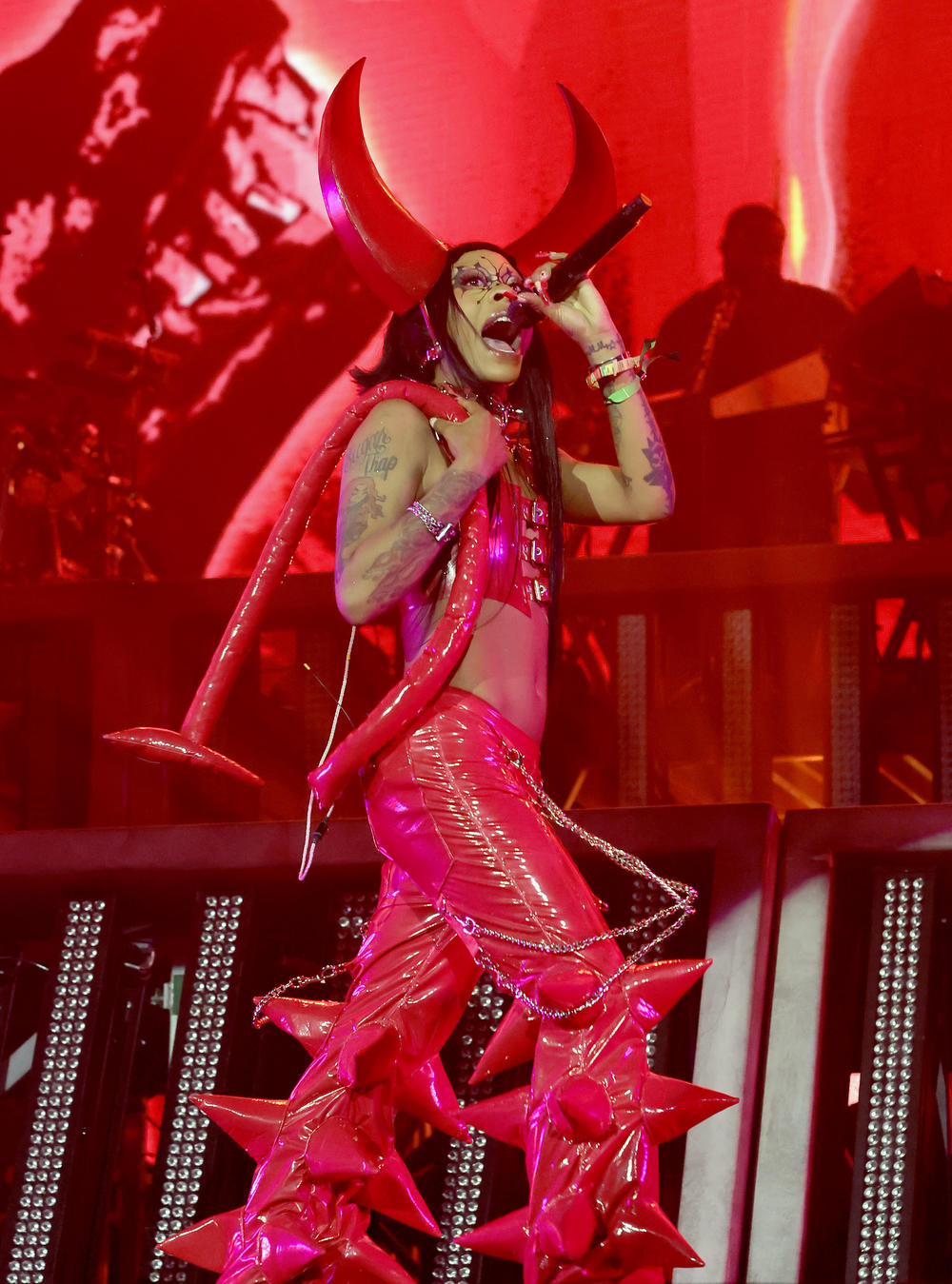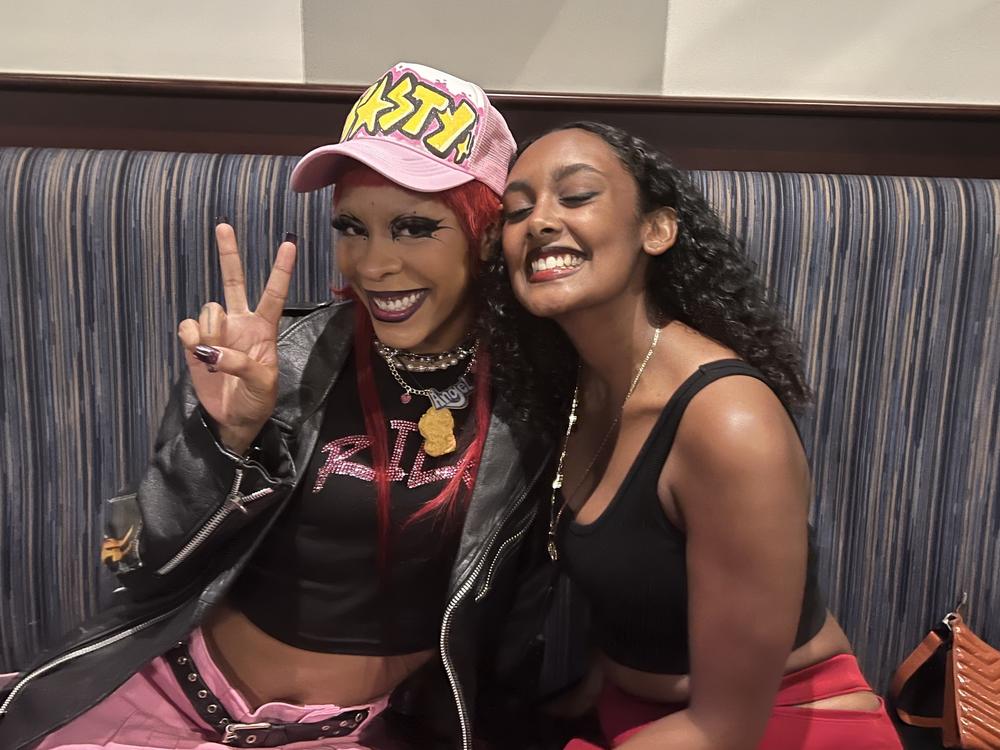Section Branding
Header Content
'I'm an outlier too'
Primary Content
This story was adapted from reporting for Episode 8 of Louder Than A Riot, Season 2. For more about the need for — and benefits of — supportive communities within hip-hop, stream the full episode or subscribe to the Louder Than A Riot podcast.
Rico Nasty has just gotten out of hair and makeup at the Moda Center in Portland. She's in the vinyl booth of the arena's backstage cafeteria before her opening set on Kehlani's Bluewater Road tour, seated with Talille Jaro, a fan who came to the show specifically to see Rico. Talille has just asked how Rico feels before her performances. Rico shrugs it off as a bottled, nervous energy. At first, Talille is surprised by this answer given how loud and raucous Rico is during her sets. "You're Rico f***ing Nasty. What? Come on!" Then, Talille catches herself. "Well, I mean, you're a person, too."
This is what sets Nasty Mob apart from most other fanbases in rap. Rico and her fans have built a community that sees the star at its center as a full person — someone who exudes confidence but isn't immune to the rollercoaster of emotions that are amplified by taking the stage. She encourages Nasty Mob to release all those heavy emotions — anger, stress, anxiety, excitement — through her music and the mosh pits at her shows. As an alt rapper in a subgenre that doesn't have many Black women as its stars, Rico's success is propelled by her commitment to be herself and her ability to inspire Nasty Mob to do the same.
For anyone who feels like an outsider, Nasty Mob is a space to forget that alienation. Rico is clear about who she puts on for; "For the people who get picked on or the people who went to school and there's a f***ing video of them losing a fight. And they deal with crazy people talking to them crazy. They get to come to the show and they get in a mosh pit and people aren't scared of them. Like these little girls that normally are hella timid and shy, they get in the mosh pit and n****s are like, 'oh s***, that's crazy.' It's a power."
Rico frequently engages with her fans on platforms like Discord, and watches them grow up as they come to her shows year after year. For content creator Masani Musa, growing up as a Rico fan shaped the kind of community she wanted to foster in her own work. And that's the example after which she built her platform, Culture Unfiltered — a pop culture hub that breaks down the deeper meanings behind trending topics in music.
Rico sees the energy her fans put into Nasty Mob — one that they carry into their outside lives — and she returns it: "They know what I do it for. They know I don't do this s*** to be cool. Like I do it because I love us and we're special and we're beautiful. And no matter how different we look, we're beautiful, plain and simple."
To Nasty Mob, Rico is more than an idol. They gravitate to her because she represents acceptance like it's pumped through a megaphone. In a landscape dominated by fan armies, this community offers many benefits, both online and IRL. So Louder Than A Riot asked Nasty Mob members Masani Musa and Talille Jaro, as well as Rico Nasty herself, to share the unspoken principles that hold it together.
1. "I been movin' how I want, f*** how you feel"
This is a space where you can be all the things you've gotten made fun of or been ignored for everywhere else.
Talille Jaro: I had never heard of [Rico] before and I was over at a friend's house. And she had music video after music video of Rico Nasty playing, and I just sat there in awe. I'd never heard music like this from someone who looked like me. I was very enthralled in her music the very first time I saw it. She was the first time I ever saw someone who was Black, was a woman who wasn't afraid to show that she was into the punk scene, that she was wearing these crazy outfits. She was like showing out for those Black teen girls who always felt awkward going to school with, like, the platform boots and crazy hair, the crazy makeup.
Rico Nasty: People get caught up in the, "'Oh, [your fans] dress like you." And it's like, I love that part because I know that in some way being, or wanting to be like me, is gonna help you find yourself. Like, cuz you're gonna realize that you can't be me. You'll never be me. You'll only be yourself and you'll learn to love yourself for that.
Masani Musa: You see artists who come up during the SoundCloud era and they go through that thing where they change who they are in order to get bigger. I don't think Rico Nasty has done that. She has stayed true to herself, and you don't see that a lot with, you know, Black artists in general, let alone Black female artists. She hasn't had any surgeries, any body modifications. And I think that's important to bring up because, you know, nowadays BBLs and breast jobs are written into contracts before girls can even get signed.
Rico Nasty: They're always gonna say something. There's always gonna be pushback when you're doing something different. When you're being yourself, not everybody is gonna like you. So f*** a pushback. I don't give a f*** [about] no damn pushback.
Masani Musa: Honestly, just existing as a Black alternative girl, it shows me that you can be yourself and you can sustain yourself and you can carve out a space in music for yourself and do what you wanna do and be who you wanna be.
2. "Hope you get to know the real me"
Nasty Mob not only idolizes Rico as an artist but respects her as a person. Allow her privacy, grace and show her emotional support when she needs it, just like you would each other.
Talille Jaro: I think a lot of artists need to go out and just express that they care for us and that they have a responsibility to not just take our dollars as like a primary consumer base, but also that, like, we are important. We are real, we are people and they need to care about us in every single regard.
Masani Musa: [Rico is] a Black woman in an alternative hip-hop music space that isn't heavily occupied by Black women. So, she herself is an outlier. And if you are going through something in life where you don't quite understand the world, you don't quite understand yourself. It's like, 'okay, I'm an outlier too.' And, you can connect on that level.
Talille Jaro: I'm excited to see Rico happy on stage and to see just like a positive environment. I definitely think in the future, for women in hip-hop, I want to see the individuality also expressed. What makes Rico such a powerful, groundbreaking artist is that she really is an original person. And, you know, has this original taste and is showing out for the community.
Rico Nasty: That nurturing vibe in there — yeah, I think that's the mother in me. So, I feel like I bring out a lot of moms too. And I had my son when I was 18. So, you know, I'm pretty sure that some of my fans are moms. They're like, "Babe, are you okay? You need some water, you need something?"
3. "The expression of anger is a form of rejuvenation"
Catharsis is welcomed. Scream, mosh, thrash. Let it out.
Masani Musa: Me and my sister, we really enjoy alternative rap and we've been tapped into that realm of rap for a very long time. But oftentimes when we go to these shows, we are one of the few Black women there. When I listen to Rico Nasty's music, first and foremost, I can get all of that built up stress out. Songs like "Rage," songs like "Smack A Bitch," you know, songs like "Key Lime OG", you know, they all get me hype — and I can't get this anywhere else but Rico's music. She ignites a certain energy in me as a Black alternative girl. She's a stress reliever in a way where all of that angst kind of dissolves.
Rico Nasty: I find comfort in screaming and doing all that because not everybody can do that in the moment when they're going through what they're going through. I mean, people that's really like getting bullied and s*** too, they're not gonna fight back. They're just gonna shut down. That's what I used to do. Like I would shut down and not say s***, but then it just started being like, you gotta take control.
I'm making music for the people who don't know if they should say no. For the people that do too much. For the people who get too loud, get too rough. The girls that are too tough, the girls that are just not soft enough for society.
Talille Jaro: "Smack a Bitch" is a great song. Anyone ever needs to feel really comfortable with themselves and let out, you know, this anger in the world, that is the perfect song. I also [feel] like her voice just in general, screaming the song like it just, awoken something in me to just feel comfortable and it's okay to be like angry. It's okay.
["Smack A Bitch"] really hits after work. Like wow. After being in the customer service side of things and talking to people who don't even want to tolerate you ... Yeah. It's nice. I don't know if she made music for people in the service industry, but I think it serves.
4. "I be with my day ones, 'cause I don't fake kick-it'"
Have each others' backs. A show is a space where a community finds its truest expression, so collective support is key.
Talille Jaro: The atmosphere [at Rico's shows is] amazing. I didn't feel like the people around me were like, I don't know, plotting against me. So, that felt really nice. I kind of honestly feel relaxed, like it took some of the stress and anxiety away.
Rico Nasty: I always see the girls...I've seen so many mosh pits where it's like a big ass, six foot n**** just passed out and it goes like, "Please, gently, don't drop him. Security!" They're so sweet to one another.
Talille Jaro: I'm excited to go into a space that I feel like is primarily gonna be like that community of women supporting women. And I feel like it's going to be a respective audience. [To Rico:] I feel like you made us — Black girls who dress alternatively or like, feel like weirdos — you made us feel comfortable and safe. Like, I feel like I've gained so much confidence just by listening to your music.
Copyright 2023 NPR. To see more, visit https://www.npr.org.



